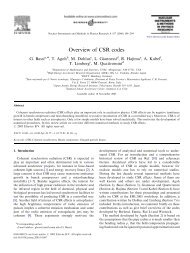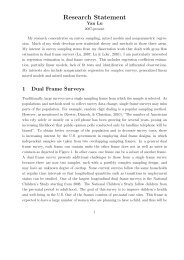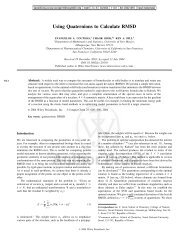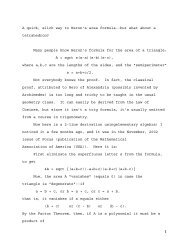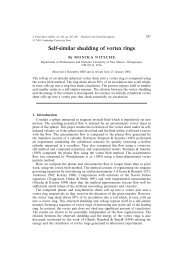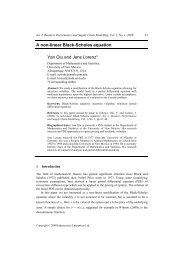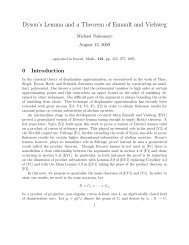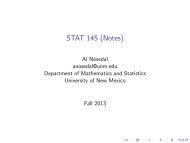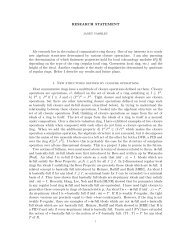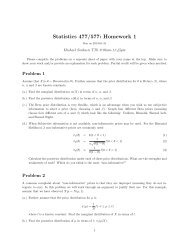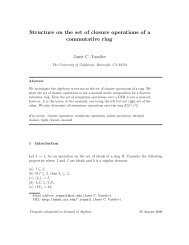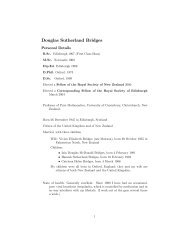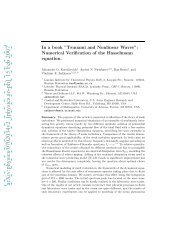OEO Office of Equal Opportunity - Department of Mathematics and ...
OEO Office of Equal Opportunity - Department of Mathematics and ...
OEO Office of Equal Opportunity - Department of Mathematics and ...
You also want an ePaper? Increase the reach of your titles
YUMPU automatically turns print PDFs into web optimized ePapers that Google loves.
SOCIOLOGY 287<br />
Graduate Program<br />
Graduate Advisor<br />
John Roberts<br />
Review <strong>of</strong> Applications<br />
Fall Admission: For best consideration all materials must be<br />
received by February 1. Application files that are completed<br />
between February 1 <strong>and</strong> April 1 will be considered pending<br />
space availability. Spring Admission: These dates are<br />
September 30 <strong>and</strong> November 1.<br />
Degrees Offered<br />
The graduate program in sociology leads to a Master <strong>of</strong> Arts<br />
degree <strong>and</strong>/or to a Ph.D. degree. Admission to graduate work<br />
for the M.A. degree in sociology is independent <strong>and</strong> separate<br />
from admission to graduate work for the Ph.D. in sociology.<br />
The M.A. degree in sociology is <strong>of</strong>fered under the regulations<br />
described earlier in this catalog.<br />
The M.A. Program<br />
Admission to the sociology M.A. program depends on a<br />
strong record <strong>of</strong> academic performance at the undergraduate<br />
level. While the entire application is considered, <strong>and</strong> no<br />
precise GPA cut<strong>of</strong>f is used, competitive applicants generally<br />
have at least a B average (3.0 in a 4.0 system) in previous<br />
academic work. GRE scores (general test) are also evaluated<br />
as part <strong>of</strong> the application procedure. Applicants are also<br />
asked to submit a letter <strong>of</strong> intent, three letters <strong>of</strong> recommendation<br />
<strong>and</strong> two writing samples.<br />
Entering graduate students are expected to have had at<br />
least 12 semester hours <strong>of</strong> advanced undergraduate work<br />
in sociology, especially including satisfactory performance in<br />
sociological research methods <strong>and</strong> theory. A graduate student<br />
admitted with deficiencies in any <strong>of</strong> these prerequisites must<br />
remove the deficiencies by satisfactorily completing (with<br />
a grade <strong>of</strong> at least B, 3.0) the appropriate undergraduate<br />
course work. Credit hours earned in courses taken to remove<br />
such deficiencies do not apply to the minimum hours required<br />
for a master’s degree.<br />
Plan I: Under this plan, the M.A. degree requires 24 hours<br />
<strong>of</strong> course work, 6 hours <strong>of</strong> thesis, a written thesis <strong>and</strong> passing<br />
the Final examination for the Thesis. Students need to<br />
maintain a cumulative GPA <strong>of</strong> at least 3.0, <strong>and</strong> all required<br />
courses must be completed with a grade <strong>of</strong> at least B-. After<br />
completing 12 hours <strong>of</strong> course work, <strong>and</strong> in consultation with<br />
the major advisor, students must file a Program <strong>of</strong> Studies<br />
with the <strong>Office</strong> <strong>of</strong> Graduate Studies. Before writing a thesis,<br />
students must appoint a thesis committee consisting <strong>of</strong> a<br />
chairperson <strong>and</strong> at least two additional faculty members. At<br />
least two <strong>of</strong> the committee members must hold regular fulltime<br />
faculty appointments at The University <strong>of</strong> New Mexico.<br />
Plan I is the normal track for students interested in pursuing<br />
a Ph.D. in sociology.<br />
Plan II: Under this plan, the M.A. degree requires 26 hours<br />
<strong>of</strong> course work, 6 hours <strong>of</strong> pr<strong>of</strong>essional paper course work,<br />
a pr<strong>of</strong>essional paper <strong>and</strong> passing the Final Examination for<br />
the Pr<strong>of</strong>essional Paper. Students need to maintain a cumulative<br />
GPA <strong>of</strong> at least 3.0, <strong>and</strong> all required courses must be<br />
completed with a grade <strong>of</strong> at least B-. After completing 12<br />
hours <strong>of</strong> course work, <strong>and</strong> in consultation with the major advisor,<br />
students must file a Program <strong>of</strong> Studies with the <strong>Office</strong><br />
<strong>of</strong> Graduate Studies. Before writing a pr<strong>of</strong>essional paper,<br />
students must appoint a committee consisting <strong>of</strong> a chairperson<br />
<strong>and</strong> at least two additional faculty members. At least two<br />
<strong>of</strong> the committee members must hold regular full-time faculty<br />
appointments at The University <strong>of</strong> New Mexico.<br />
Core course requirements for all student seeking a master’s<br />
degree in sociology consist <strong>of</strong> (i) 6 hours <strong>of</strong> graduate<br />
sociological theory from two <strong>of</strong> the following three courses:<br />
Sociology 500 Classical Sociological Theory, Sociology<br />
513 Constructing <strong>and</strong> Analyzing Contemporary Sociological<br />
Theory (Contemporary Social Thought I) <strong>and</strong> Sociology<br />
514 20th Century European Theory (Contemporary Social<br />
Thought II); (ii) Sociology 523 Proseminar (students should<br />
take this as early in their career as possible); (iii) Sociology<br />
580 Methods <strong>of</strong> Social Research I, (iv) Sociology 581<br />
Advanced Social Statistics I; <strong>and</strong> (v) at least 9 hours <strong>of</strong> substantive<br />
courses in the social sciences, as approved by the<br />
<strong>Department</strong>’s Graduate Committee.<br />
In addition to these 22 core hours required <strong>of</strong> all M.A. students,<br />
Plan I students must complete at least 8 more hours<br />
<strong>of</strong> course work, including 6 hours <strong>of</strong> thesis credit (Sociology<br />
599). Plan II students must complete at least 10 more hours<br />
<strong>of</strong> course work, including 6 hours <strong>of</strong> pr<strong>of</strong>essional paper credit<br />
(Sociology 596). Note that once in enrolled in Sociology 596<br />
or 599, c<strong>and</strong>idates must stay continuously enrolled in that<br />
course each semester, including the semester (Fall, Spring or<br />
Summer) in which they complete degree requirements.<br />
The Ph.D. Program<br />
The Ph.D. program is highly selective. All formal requirements<br />
for admission to the M.A. program are necessary but not sufficient<br />
for admission to the Ph.D. program. Ph.D. students must<br />
first obtain a master’s degree at the University <strong>of</strong> New Mexico<br />
or at another institution. Successful completion <strong>of</strong> the M.A.<br />
program does not ensure admission to the Ph.D. program.<br />
General requirements for the Ph.D. are set forth in earlier<br />
pages <strong>of</strong> this catalog. The Ph.D. degree requires 48 hours <strong>of</strong><br />
course work <strong>and</strong> 18 hours <strong>of</strong> dissertation. Students must also<br />
pass comprehensive examinations <strong>and</strong> write <strong>and</strong> successfully<br />
defend a dissertation. Specific requirements for all students<br />
seeking a Ph.D. in Sociology include: Sociology 500 Classical<br />
Social Theory; Sociology 513 Constructing <strong>and</strong> Analyzing<br />
Contemporary Sociological Theory (Contemporary Social<br />
Theory I); Sociology 514 20th Century European Theory<br />
(Contemporary Social Theory II); Sociology 523 Proseminar<br />
(students should take this course as early in their careers<br />
as possible); Sociology 580 Methods <strong>of</strong> Social Research;<br />
Sociology 581 Advanced Social Statistics I; Sociology 582<br />
Advanced Social Statistics II; <strong>and</strong> another methods or statistics<br />
course approved by the Graduate Advisor; 18 units<br />
<strong>of</strong> Sociology 699 Dissertation; passing all required courses<br />
with at least a grade <strong>of</strong> B-; Comprehensive Examinations<br />
(written <strong>and</strong> oral); a Ph.D. dissertation <strong>and</strong> passing the Final<br />
Examination for Doctorate. Prior to taking the comprehensive<br />
examinations, a Committee <strong>of</strong> Studies must be appointed<br />
which consists <strong>of</strong> at least three University <strong>of</strong> New Mexico<br />
faculty members approved for graduate instruction. The<br />
chairperson must be a regular faculty member approved by<br />
the student’s graduate unit. A doctoral student must apply for<br />
<strong>and</strong> be admitted to doctoral c<strong>and</strong>idacy after completing all<br />
course work <strong>and</strong> passing the comprehensive examination.<br />
The Dissertation Committee will consist <strong>of</strong> at least four members<br />
approved for graduate instruction: two members must<br />
hold regular, full-time faculty appointments at the University<br />
<strong>of</strong> New Mexico; one member must be from the student’s<br />
graduate unit; the dissertation chairperson must be a regular<br />
(tenured or tenure-track), full-time member <strong>of</strong> the University <strong>of</strong><br />
New Mexico faculty; a required external member must hold a<br />
regular full-time appointment outside the student’s unit/department<br />
at the University <strong>of</strong> New Mexico. This member may be<br />
from the University <strong>of</strong> New Mexico or from another accredited<br />
institution; one member may be a non-faculty expert in the<br />
student’s major research area. Doctoral c<strong>and</strong>idates must be<br />
enrolled during the semester in which they complete degree<br />
requirements, including the summer session.<br />
Sociology (SOC)<br />
101. Introduction to Sociology. (3) Fiala, Lopez, Tiano<br />
Basic concepts, topics <strong>and</strong> theories <strong>of</strong> contemporary sociology.<br />
Meets New Mexico Lower Division General Education<br />
Common Core Curriculum Area IV: Social/Behavioral<br />
Sciences (NMCCN 1113).<br />
Prerequisite for more advanced courses in sociology.<br />
{Summer, Fall, Spring}<br />
ARTS AND<br />
SCIENCES<br />
UNM CATALOG 2006–2007 Symbols, page 611.



